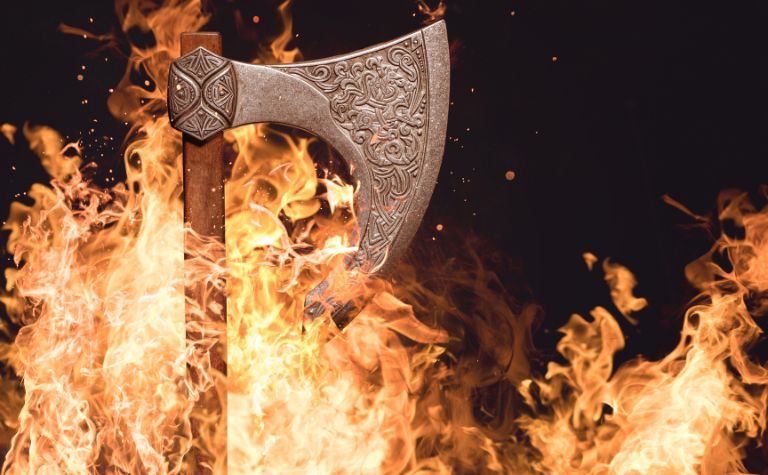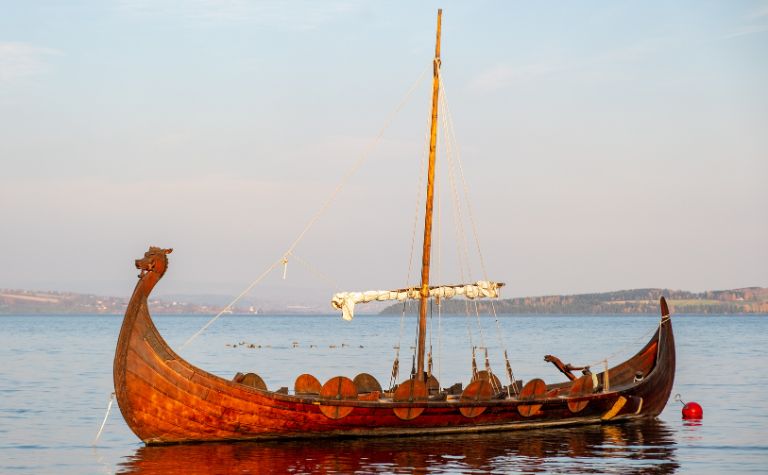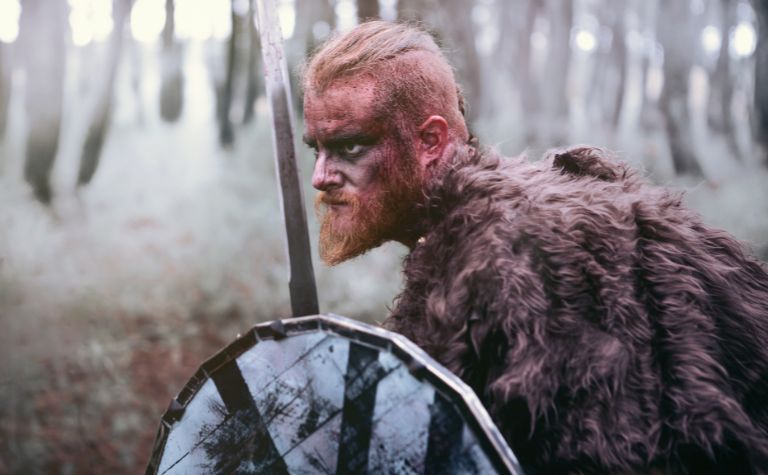Are you curious about who rules over Valhalla in Norse mythology? Unravel the mystery as we explore the realm of the gods and the figure at the heart of this legendary hall of warriors.
Odin, the Allfather, rules Valhalla in Norse mythology. As a god known for his wisdom and courage, he presides over the Einherjar, brave fallen warriors.
His rule is key to understanding Valhalla and its place in the Norse cosmos.
Why is Valhalla called a Hall? What does it have to do with slain Vikings? Who are the Einherjar and the Valkyries? Why and how does Odin rule over Valhalla? How does Valhalla relate to Asgard?
Keep reading to learn the answers to these questions and more.
Also, see Where Was Vikings Valhalla Filmed? to learn more.

Understanding Valhalla: The Hall of the Slain
Before we delve into who rules Valhalla, it’s crucial to understand what Valhalla is in the first place.
In Norse mythology, Valhalla is more than just a location—it’s a destination of honor, courage, and valor.
In Old Norse, Valhalla translates to the “Hall of the Slain.” It’s envisioned as a vast and magnificent hall located in Asgard, the realm of the gods.
As the name suggests, it’s the dwelling place of those who’ve fallen in battle.
But these aren’t just any fallen warriors; they’re the bravest of the brave, chosen by the Valkyries, the female figures who decide who will die in battle and who will live.
The concept of Valhalla is deeply interwoven with the Norse ethos of bravery and glory in battle.
Warriors who’ve fallen bravely in battle are brought to Valhalla by the Valkyries, where they await the ultimate conflict, Ragnarök.
The chosen ones, known as the Einherjar, spend their days in glorious battle, only to be revived at the day’s end to feast and celebrate in the hall.
This process is repeated day after day until the advent of Ragnarök.
In ancient texts and modern interpretations alike, Valhalla is portrayed as an emblem of Viking courage and honor.
It’s a place where battle and bravery are celebrated, where the concept of dying in battle is not seen as a tragic end but as a passage to eternal glory.
Having this understanding of Valhalla gives us the necessary context to comprehend the stature and the role of its ruler.
It tells us that the one who rules over Valhalla must be a figure of immense power and reverence, capable of commanding respect from these valorous warriors.
With this backdrop, we can now delve into the god who presides over this hall of heroes.

Odin: The Ruler of Valhalla
After gaining an understanding of Valhalla, it’s time to meet its ruler: Odin, the Allfather, one of the most significant and complex figures in Norse mythology.
This is the god who presides over Valhalla, ruling the realm with wisdom, courage, and a keen interest in the fate of mortals and gods alike.
Odin is often depicted as a wanderer or a sage, an image that signifies his endless pursuit of knowledge.
He’s known for his sacrifices in the quest for wisdom, including sacrificing one of his eyes to drink from the Well of Wisdom, thus gaining immense knowledge.
This trait of relentless pursuit of wisdom is one of the characteristics that set Odin apart in the Norse pantheon.
In the context of Valhalla, Odin’s role becomes even more intriguing. The Einherjar, the warriors chosen by the Valkyries, become his companions.
They dine with him, fight with him, and prepare with him for the prophesied Ragnarök, the cataclysmic event that will result in the death of many major figures, including Odin himself.
The respect and loyalty Odin commands from the Einherjar underline his ability to rule over the heroic and brave.
One important aspect of Odin’s rule over Valhalla is his relationship with the Valkyries.
These female figures, often portrayed as Odin’s helping spirits, have the responsibility of deciding who will die in battle and who will be honored with a place in Valhalla.
They can be seen as Odin’s emissaries, ensuring the hall of heroes continues to house the bravest of warriors.
Understanding Odin is key to understanding Valhalla’s place in Norse mythology.
His pursuit of wisdom, preparation for Ragnarök, and his bond with the Einherjar and the Valkyries reveal much about Valhalla’s purpose and importance in the larger Norse cosmology.
His rule over Valhalla is not just about governance but about preparing for the fate that awaits the gods and the world itself.

The Role of Valhalla in the Bigger Picture of Norse Cosmology
Now that we have an understanding of Valhalla and its ruler, Odin, let’s see where this hall of heroes fits within the broader landscape of Norse cosmology.
Valhalla is part of Asgard, one of the Nine Worlds in Norse mythology. Asgard is the realm of the gods, home to the Aesir, the group of gods to which Odin belongs.
Valhalla’s location in Asgard emphasizes its divine nature and the high honor associated with being chosen to dwell there.
But Valhalla isn’t merely a reward for bravery in battle. It plays a key role in the prophesied events of Ragnarök, the Norse apocalypse.
This end-of-the-world scenario involves a great battle during which many gods, including Odin and the Einherjar, will fight against the forces of chaos.
The Einherjar’s time in Valhalla is essentially a period of preparation for this crucial battle. Their days are spent in endless fighting, honing their skills for Ragnarök.
The role of Valhalla in the events of Ragnarök showcases Odin’s wisdom and foresight.
As the ruler of Valhalla, he prepares his warriors not just for the joys of the present but for future responsibilities.
In this context, Valhalla serves not just as a place of honor but as a key element in the cosmic scheme of Norse mythology.
It’s not an endpoint but a vital part of a larger narrative that culminates in the events of Ragnarök.
Valhalla, under Odin’s rule, represents the nexus of honor, preparation, and duty, holding a pivotal role in the narrative of Norse mythology.
Conclusion
In wrapping up our exploration, we can see that Valhalla, the “Hall of the Slain,” is a complex and integral part of Norse mythology.
This glorious hall, home to the bravest fallen warriors, is more than a place of honor; it’s a realm of preparation for the ultimate battle of Ragnarök.
Odin, the Allfather, presides over Valhalla, guiding and preparing the Einherjar for the challenges that lie ahead.
His wisdom and foresight, demonstrated in his rule, give us a deeper understanding of Valhalla’s significance in the Norse cosmos.
Furthermore, Valhalla’s role within the larger Norse cosmology can’t be overstated.
This hall of heroes is not just a destination; it’s a key component in the grand narrative that is Norse mythology.
